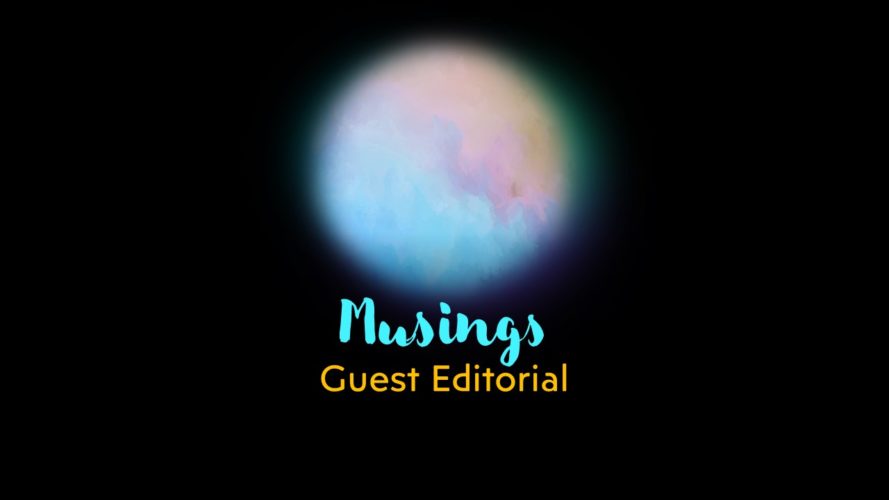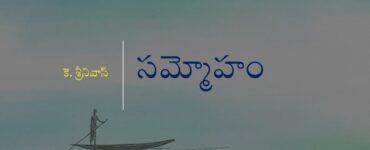 Life is a storm at sea, I remind myself on most difficult days (days which mark a disjunct between the ideal and the attainable; days which sit uneasily on expectation’s naive wall; days which slide off the skin of existence without finding a way in; days when the world callously accelerates and flames, when the self is incognisant of itself, and even the body refuses to home the spirit). Every time I think of a storm at sea, I am reminded that it is possible to both belong to the storm and to govern it, to partake of its majesty as well as its challenge, to recognize its power and to negate its spell.
Life is a storm at sea, I remind myself on most difficult days (days which mark a disjunct between the ideal and the attainable; days which sit uneasily on expectation’s naive wall; days which slide off the skin of existence without finding a way in; days when the world callously accelerates and flames, when the self is incognisant of itself, and even the body refuses to home the spirit). Every time I think of a storm at sea, I am reminded that it is possible to both belong to the storm and to govern it, to partake of its majesty as well as its challenge, to recognize its power and to negate its spell.
The earliest lesson in this, certainly, came to me from Shakespeare’s boatswain in The Tempest, the only character who kept minding his own business in that brilliant opening scene of the play and refused to be blown away by the storm because he was, perhaps, the one who knew it best. (To my mind, the boatswain always appears with the bard’s own words from Sonnet 116 – “an ever-fixed mark/ That looks on tempests and is never shaken”.) Subsequent lessons, too, have arrived to me from books. Now that literature has widened its frontiers and effectively adapted itself to technology and multimedia, such lessons can, joyously, come from anywhere.
These days and to be precise, since the Pandemic, I have regularly found myself scrolling through Facebook when I wake up in the mornings, diligently looking for a thought to peg my day. Mostly, I am rewarded (as I believe, every sincere seeker everywhere, is) and I return from the street of my newsfeed, clutching something precious that will allow me to add metaphysical/imaginative density to the geometry that an ordinary world gives to an ordinary day.
I, thus, need literature each day as urgently as I need food, water, air, and sunshine, and so I am sure, do each one of us. The mind, like the body, must be well-fed and what we feed it with is vital to the way it programmes us and leads us to perceive the world. Feeding the mind with clarity, empathy, honesty and nobility is indispensable to individual well-being and to the possibility of a healthy world, good literature being one of the most trusted dietary sources of the mind.
Contrary to what a whole lot of people are inclined to believe, there is not an iota of luxury about the conception, production or consumption of literature. At any given moment, the act of writing constitutes a highly charged battlefield. Whether one is writing from a calm, comfortable, and well-equipped room of one’s own or from a noisy niche in a crowded railway platform, in the mind’s chasm (and I consciously evoke Coleridge here), the seething and panting continue unabated. (For readers too, irrespective of their geo-emotional locations, the serious labour of engaging with a text requires a relentless back and forth communication between text, world and self.)
To many, such labour manifests itself as completely gratuitous or worse, epically futile. While the intellectual labour of philosophers, scientists, and academicians is regarded as indispensable to knowledge-building, the creative labour of litterateurs often goes discounted by their contemporaries. It is not until a literary truth has been tested sufficiently by time (in some cases, circumstance) that it acquires some general currency. It is no surprise, then, that general recognition in literature comes whole-heartedly only posthumously.
The question, in the face of all this doubt and disparagement, is why continue to write? Why continue to knock our frail selves against the well-fortressed frontiers of light? Why make the contour and composition of words our business? Why unmake and remake this world in visions that will have few, if any, takers? These questions, as any reader or writer will premise, are essentially rhetorical.
We write to abide by no principle except ourselves. We write because after Prometheus, we consider light, however scant, both a right and a privilege. We write to cast the world in unprecedented modes of language. We write because to not do so, would be an affront to whatever runs ceaselessly in our veins.
Life will, mostly, be a storm at sea. We need literature not to teach us to predict a storm or to escape it or to measure its sound or speed but to remind us that should it come, we must refuse to be subdued by it. One must know how to position oneself on both sides of a storm – to be boatswain and bard, actor and witness, respondent and recorder. In short, we need literature to face the storm.
*









Wonderful write up! It creates a soul space for the reading world.